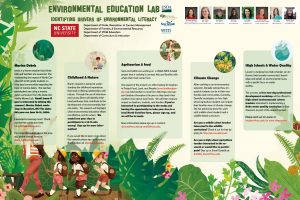Almost all of our projects are built around significant engagement with classroom teacher and community partners. If you would like to partner with us, we would love to hear from you!
Classroom Teachers: Want to work with us?
 We love teachers! Many of our projects come with professional development, stipends, and evaluation data. Interested in participating in our research? We would love to have you! Learn more about our current projects and who to contact here.
We love teachers! Many of our projects come with professional development, stipends, and evaluation data. Interested in participating in our research? We would love to have you! Learn more about our current projects and who to contact here.
Are you looking for curricular resources?
As many teachers transitioned to online instruction starting in March 2020, we tried our best to support those of you working on our projects by pulling together online resources. If you find these helpful, please use them!
Resources for teaching about Food & Agriculture
Resources for teaching about Marine Debris and the Ocean
How Kids Can Help Solve Environmental Problems — guest lecture recorded by Dr. Stevenson for a 2nd grade class
Resources for teaching about Wild Horses at Cape Lookout National Seashore (lessons housed both through NC State and the National Park Service)
In addition to these, we have a few curricula we have researched that we can recommend: Wildlife, Weather, Climate & Change — a climate change curriculum for middle schoolers, and the Duke Marine Lab Marine Debris curriculum. We also encourage educators to consider “the Projects”: Project Learning Tree, Project WET, Project WILD, Project Food, Land, and People, and others. The NC Office of Environmental Education maintains a calendar of associated professional development opportunities, ideas for field trips, and information on the EE Certification Program.
Are you looking for research you can use?
Sometimes you need some data to help tell your story. If browsing our publications page isn’t what you’re looking for, you might be interested in several of the infographics we have made on predictors of environmental literacy, and how EE might provide catch-up effects for students who can struggle in traditional school settings, including those with IEPs. We also encourage you to visit the eeResearch Library, a searchable database of summaries of peer reviewed articles, as well as several infographics made by the Children & Nature Network.

